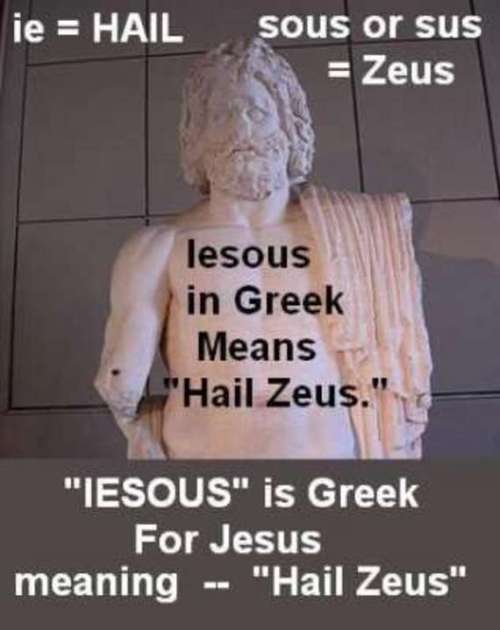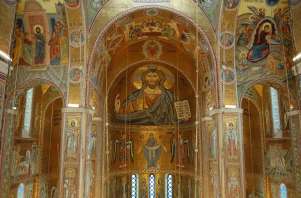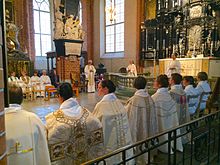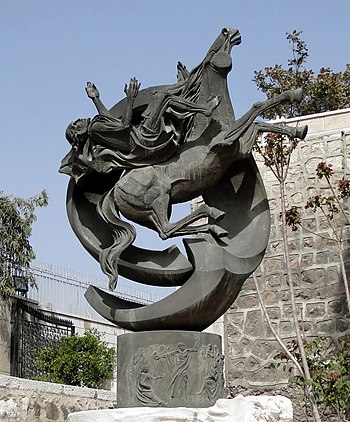There are 2 passages in the Bible which appear to say that women should be silent in church.
1 Cor. 14:34-35 & 1 Tim. 2:11-12
A closer look shows that they are talking about different things and use a different Greek word for silence.
1 Corinthians 14:34-35 (KJV)
“ Let your women keep silence in the churches: for it is not permitted to them to speak; but they are commanded to be under obedience as also saith the law. And if they will learn any thing, let them ask their husbands at home: for it is a shame for women to speak in the church.”
Notice that it doesn’t just say that women can’t speak – even if they have a question they must ask their husbands at home. This implies that husbands are able to answer their wives spiritual questions.
Notice also that Paul appeals to the law, but he doesn’t say where he’s quoting from.
What’s also interesting is it seems to be the ONLY time Paul says he’s quoting the Old Testament, and he doesn’t back it up with the quote.
Let’s take a look at Paul’s normal writing style when he says he’s quoting scripture.
CITING QUOTES – (Thanks to Ian McHaffie for his research on this)
Paul introduces an Old Testament quote by “It is written” about 30 times and Includes full quote
Paul says “it says” or “the law says” about 25 times and includes the quote.
Sometimes Paul just quotes with no introduction about 36 times
So that’s a total of 91 times where Paul gives the actual quote.
The only where he says he’s quoting scripture, but doesn’t say where, seems to be this verse .
It seems strange that if this is a weighty passage intended to stop women speaking for all time – that Paul doesn’t back it up with the exact scripture in the way he normally does. There’s another possibility. Corinthians was written to mostly Gentile believers living in a Roman city. Maybe it’s Roman Law mentioned here.
ROMAN LAW
The word “law ”in 1 Cor. 14 can mean any law whatever -not just the law of Moses. For example Rom.3:27 “Where is boasting then? It is excluded. By what law? Of works? No, but by the law of faith – so here the word law refers to a law of works and a law of faith. It’s possible the word Law in 1 Cor. 14 could be referring to yet another Law – the Roman Law. Under Roman law a woman was subject to a man all her life. The Romans had a law called Patria Potestas -power of a father – absolute authority – power over life and death. When his daughter married this power could either go to her husband to have control over her, or stay with the father, whichever way, she was always controlled by a man.
But the traditional church argument has been that Paul is referring to Genesis and a Law that women must submit to men. Let’s see if such a law exists.
GENESIS 3:16 is where the traditional argument takes us back to – the events in Eden.
“Thy desire shall be to thy husband, and he shall rule over thee.”
What is the context of this verse ? It’s often been interpreted through Paul – but let’s think about it again realising that we don’t know if Paul was referring to it.
What happened in Eden was a breakdown of relationships, especially with God, and it lead to sin. When Eve was tempted she didn’t turn to God, she turned to her husband. It was a mistake to turn to her husband, she should have turned to God.
It’s also interesting that the term, “cursed”, arur, is absent from God’s announcement to Eve. The serpent is cursed above all the animals and punished, and because of Adam’s sin, the earth is cursed. But nothing is cursed, using the word ‘arur ‘because of Eve.
Let’s compare this verse in Gen. with Paul’s verse in Corinthian –
“Your desire will be for your husband,
and he will rule over you.” Genesis 3:16
“They are not allowed to speak, but must be in submission, as also the law says. If they want to learn something, they should ask their own husbands at home; for it is disgraceful for a woman to speak in the church.” 1 Cor. 14:34
Notice that The verse in Genesis isn’t a commandment, it’s a statement -That men WILL rule over women – a prophecy. The verse in Cor. says that women MUST be submissive to men – this is a commandment to obey, two different things.
The question is – is Paul really referring to Genesis?
The traditional view is that Paul expanded what was said in Genesis, that he in fact gave it a different meaning than we would otherwise take from it.
But why would Paul appeal to the Law in this verse, when he says so many times we are no longer under the law?
LAW QUOTES
“Through Christ Jesus the law of the Spirit who gives life has set you free from the law of sin and death.” Romans 8:2
“Christ redeemed us from the curse of the law by becoming a curse for us.” Galatians 3:13
“If you are led by the Spirit, you are not under the law.” Galatians 5:18
This Law of sin and death that we are set free from goes back to Eden. Paul is clearly referring to it and saying we are no longer under it – we still die, but if we are in Christ it doesn’t have a hold over us in a spiritual sense.
So what is this law that Paul is referring to? It’s inconsistent to say we’re NOT under the law and then to enforce it in 1 Cor. 14. Could it just be the Roman Law? Or could there be a fuller explanation?
When Jesus was tempted to take a passage of scripture at face value during his temptation in the wilderness, His response was to say “IT IS ALSO WRITTEN”. He considered the broader picture of what else the scriptures had to say. So now I’d like to do the same. Let’s think about the rest of the Bible and what it has to say about the silence of women. Let’s start by looking at some women in the Old Testament.
The Bible provides examples of women who led, spoke out, and gave wise instruction to both men and women.
I’ve heard it said that men shouldn’t listen to women because Eve deceived Adam – more about that later- but we have the example of David hearkening to the voice Abigail and it was a good thing. She stopped him from sinning. There’s the example of Deborah who judged and led Israel.
Esther who saved the nation by having the courage to speak out – A Jewish girl who married a foreign King at a time when other Jews were forcing men to divorce their foreign wives. (more about that in next post)
Huldah the prophetess -The King and priests – the most important men in all the land – went to her to hear God’s word.
Miriam was chosen by God to lead Israel along with Moses and Aaron.
NO -There weren’t as many women as men in leadership roles but there’s enough to show they DID have God’s approval. I don’t believe it was God who told women to be silent but the prophecy of male dominance taking effect.
RABBIS –Let’s have a quick look at Jewish thinking by the time of Jesus and Paul. As well as the Law of Moses they had all the interpretations of it by Rabbis known as the Mishnah and Talmud. These are some examples of what they said.
“Out of respect to the congregation, a woman should not herself read in the law.”
“It is a shame for a woman to let her voice be heard among men.”
“Even the sound of a woman’s voice is lustful.”
Josephus summed them up:
“Thus says the scripture, a woman is inferior to her husband in all things.”
So clearly these Rabbis thought women were inferior to men and made statements to say that the scriptures backed them up. There’s definitely no scripture which says that a woman is inferior to her husband in all things –it was a story going around because of how the Rabbis re-interpreted scripture.
Let’s compare these sayings with what Jesus said.
WHAT JESUS SAID
“For you have one Teacher, and you are all brethren (includes male and female). And do not call anyone on earth ‘father,’ for you have one Father, and he is in heaven. Nor are you to be called instructors (Rabbi, Master), for you have one Instructor, the Messiah. The greatest among you will be your servant.”Matt. 23:9-11 NIV
So we are not to call anyone but Jesus our instructor or leader. It’s Jesus women turn to for ultimate guidance, not their husband, nor people who wrongly interpret scripture. Likewise it’s Jesus men should turn to, not their wives. Jesus is our leader. How can women ask spiritual questions of their husbands at home if they don’t have a husband?
Let’s think about a woman with no husband. In John 4 Jesus broke the protocol of the day by talking to a woman alone. She had no husband to ask questions of.
The disciples left their nets to follow Jesus, but she left her water pot to go and preach. She was the first person to be told by Jesus that He was the Messiah
She spoke to the people (including men), of the town and “many came to believe because of the words she spoke.”
She was the FIRST to hear Jesus words and go out preaching the good news.
This was clearly an example of a woman preaching the good news of Jesus to men. This woman grasped the message of Jesus and ran with it – she didn’t need a husband to know what the right thing to do was.
Jesus TRAVELLED WITH WOMEN we are told in Luke 8:2
“He went on through cities and villages, proclaiming and bringing the good news of the kingdom of God. And the twelve were with him, and also some women.” Luke 8:2
After His resurrection He APPEARED FIRST TO A WOMAN & TOLD HER TO PROCLAIM HIS RESURRECTION – just as we should be doing now.
In John 20:17 Jesus said to Mary
“Go to my brethren, and say to them, I ascend unto my Father, and your Father; and to my God, and your God. Mary Magdalene came and told the disciples that she had seen the LORD, and that he had spoken these things unto her.”
We are told in Luke 24:11 that “It was Mary Magdalene, Joanna, Mary the mother of James, and the others with them who told this to the apostles.
But they did not believe the women, because their words seemed to them like nonsense.”
Mary became known as the “apostle to the apostles” because Jesus chose her to give the news of His resurrection to the other disciples. We are told that the 11 men didn’t believe her. We are also told that Jesus rebuked them sternly for this.
Mark 16:14 “Later Jesus appeared to the Eleven … he rebuked them for their lack of faith and their stubborn refusal to believe those who had seen him after he had risen”.
Jesus wasn’t impressed when the men refused to believe these women who were proclaiming the resurrection, especially when they had been instructed by Jesus Himself to proclaim it. This is a powerful point and warning to men who refuse to listen to women proclaim the gospel.
The New Testament is full of examples of women preaching alongside men. Just a few examples here.
Acts 2 says “ALL received the holy spirit, ALL spoke in tongues.” This is what was spoken by Joel the prophet in chapter 2:
“In the last days, God says, I will pour out my Spirit on all people.
Your sons and daughters will prophesy, your young men will see visions, your old men will dream dreams.”
It was an exciting time for the church – men and women were working together to proclaim the gospel.
We are told that Phoebe (a woman) was a servant/deacon of the church in Cenchrea in Romans 16:1-2, and that Priscilla and her husband Aquila were a preaching team “When Priscilla and Aquila heard him, they invited him to their home and explained to him the way of God more accurately.” Acts 18:26, 1 Cor. 16:9
Priscilla and Aquilla taught Apollos, they are mentioned together about 5 times and usually it’s Priscilla who is mentioned first. So in the New Testament we hear of women speaking and preaching together with men.
But what of the two difficult verses by Paul which seem to say at face value that women are to be silent???
CONTEXT
–Before we look at the quote in 1 Cor. 14 Let’s think about the context within the rest of 1 Corinthians. Paul doesn’t expect women to be silent because –
1 Cor. 11 discusses what men and WOMEN will wear when PRAYING AND PROPHESYING– both spoken activities.
1 Cor. 14:5 says “I would like every one of you to speak in tongues, but even more to prophesy”.
1 Cor. 14:26 says “When you come together, each of you has a hymn, or a word of instruction, a revelation, a tongue or an interpretation.”
1 Cor.14:39 says “Therefore, my brothers and sisters, be eager to prophesy” (NIV)
In the IMMEDIATE CONTEXT – Paul approved and encouraged both men and women speaking in the ecclesial meetings.
In the WIDER CONTEXT – Women spoke, judged, prophesied, led.
EXPLAINING 1 COR. 14:34-35
It seems to me that 1 Cor. 14:34-35 can’t be saying the opposite of what is established by the rest of the Bible. Women did instruct and speak both in the Old Testament and New Testament WITH GOD’S APPROVAL.
The difficulty with 1 Cor. Is that Paul is answering a whole series of questions. We have the answers but not the questions, nor the punctuation in the original Greek to make the questions stand out. We know that all through 1 Cor. Paul is answering questions that have been written to him. 1 Cor. 7:1 makes this clear when Paul says “Now for the matters you wrote about”.
I believe that the strongest explanation for this puzzling verse is that it’s actually Paul quoting one of these questions that he’s been asked .
1 Corinthians 14 is a QUOTATION of the matters they wrote about.
This is what it looks like if we put the words of Paul in italics
QUOTATION 1 Cor. 14:34-35
Paul’s words – Italics
“And the spirits of prophets are subject to prophets. For God is not a God of confusion but of peace.”
“As in all the churches of the saints, the women should keep silence in the churches. For they are not permitted to speak, but should be subordinate, as even the law says. If there is anything they desire to know, let them ask their husbands at home. For it is a shame for women to speak in church”.(PART PAUL IS QUOTING THEY HAVE WRITTEN TO HIM ABOUT)
“What?
Did the word of God originate with you? Or are you the only ones it has reached?” (Paul dismisses the idea as nonsense)
I think this passage is the outcome of the Rabbis re-interpreting Genesis 3:16, something that was the thinking of the day, and is one of the “things you wrote about” which Paul refers to.
This theory makes sense of the strange exclamation of “What” at the start of verse 36 -It’s Paul’s dismissal of such an idea that women can’t speak. If we understand it like this, then Paul’s message takes on the opposite meaning to the traditional view. It’s dismissing the silly idea of women not being able to speak. Let’s look more closely at Paul’s dismissal of the idea.
If we understand that the passage is something quoted – then this response from Paul makes sense. The problem verses would be a whole new teaching that contradicts Jesus.
Women to be silent and ask questions of their husbands? Paul challenges this new teaching with two questions.
- “Came the word out from you?” – The word came out from Jesus not these men.
- “Came it unto you only?” “only” = alone – without a companion. Were these men alone receiving a new teaching and not the women?
In Jesus women are “Sons of God”. Being male or female doesn’t matter, they are born of God’s will not men’s will, nor a husbands will.
“To all who did receive Him, to those who believed in His name, He gave the right to become children of God – children born not of natural descent, nor of human decision or a husband’s will, but born of God.” John 1:12
Let’s move on the Paul’s other difficult quote in 1st Timothy
What was Paul’s Purpose of Writing to Timothy?
Paul tells Timothy to stay in Ephesus – so that he could command certain people not to teach false doctrine. So our setting is Ephesus in the 1st Century and there is a problem with wrong doctrine. Lets’ try and go back in time to ancient Ephesus, and try to understand the wrong doctrines that were in circulation.
ANCIENT EPHESUS – Was the home of the Temple of Artemis – one of the 7 wonders of the ancient world.
Ephesus was the trade centre of the ancient world. It was a melting pot of myths.
Trying to understand these myths is useful when thinking about the problems that Paul is addressing in his letter to Timothy

Archaeological site Ephesus at the time of Marcus Ampe’s 1992 visit
Besides the cult of Artemis, there is evidence of various mystery religions, the practice of magic (Acts 19:19), worship of Egyptian gods as well as a large number of other gods.Legend has it that the city of Ephesus was founded by the Amazon women who also built the first temple to Artemis. Ancient Statues of the Amazon women still exist. Artemis, according to Greek mythology, is one of the virgin goddesses who remained independent and free of any man. She is the Goddess of pregnant women and childbirth, Goddess of all animals and Goddess of the hunt.
Let’s think about the Amazon women who supposedly founded Ephesus.
AMAZON WOMEN – According to Greek mythology the Amazons were a nation of all female warriors who originated from Northern Turkey. They were skilled warriors who rode horses, enslaved men and forced them to build the city of Ephesus. They also worshipped Artemis. By the time of Paul Artemis had merged into Diana of the Ephesians.
DIANA of the Ephesians
We know from Acts 18 that Diana was worshipped all over the Roman Empire, and this is confirmed by ancient coins which even call her “Saviour”. From Acts 19:27 we have the quote
“The goddess herself, who is worshiped throughout the province of Asia and the world.”
She had many titles, one of them was PROTECTOR OF WOMEN IN CHILDBIRTH
The Roman Diana had evolved from the Greek One. The idea of powerful independent women was reinforced in the Artemis cult because unlike other Greek goddesses, Artemis had no need of a male partner. Images of the Amazon women also lined her temple in Ephesus.
Philosophers, Myths -As we’ve seen Ephesus was a breeding ground for myths and also attracted philosophers. Paul said –
“Where is the wise person? Where is the teacher of the law? Where is the philosopher of this age? Has not God made foolish the wisdom of the world? For since in the wisdom of God the world through its wisdom did not know him, God was pleased through the foolishness of what was preached to save those who believe. Jews demand signs and Greeks look for wisdom, but we preach Christ crucified.” 1 Cor. 1:20-25

Ephesus, library of Celsus – Photo by Marcus Ampe
Here in Ephesus the thinkers of the age came together. There was a statue in the library in AD 117 where wisdom or Sophia was personified as a woman.
At some stage there were the Gnostic stories going around. It’s hard to date the origin of the Gnostic stories as they evolved over time, but it seems likely that the ideas that fed them would have been present in Ephesus at the time of Pauls writings. This is one of the Gnostic texts which mentions Eve as the daughter of Sophia (Wisdom) who wakes Adam from sleep.
Myth – Eve made first (difficult to date the origins of these myths)
Sophia sent Zoe, her daughter, who is called “Eve,” as an instructor in order that she might raise up Adam, in whom there is no spiritual soul so that those whom he could beget might also become vessels of light. When Eve saw her companion, who was so much like her, in his cast down condition she pitied him, and she exclaimed: “Adam, live! Rise up upon the earth!” Immediately her words produced a result for when Adam rose up, right away he opened his eyes. When he saw her, he said: “You will be called ‘mother of the living’, because you are the one who gave me life.“ from ‘On the Origin of the World’
We’ll keep these ideas in mind while we look at Paul’s other difficult passage.
Paul’s other difficult passage
SILENCING WOMEN ? 1 Tim 2:11-15
“Let the woman learn in silence with all subjection. But I suffer not a woman to teach, nor to usurp authority over the man, but to be in silence. For Adam was first formed, then Eve. And Adam was not deceived, but the woman being deceived was in the transgression. And she shall be saved in childbearing, if they continue in faith and charity and holiness with sobriety.”
At face value Paul appears to be silencing women because Adam was made first and wasn’t deceived like Eve was. He appears to be giving Adam an elevated status and endorsing a MALE HIERARCHY. Let’s see how these ideas compare to the teachings of Jesus.
Would Paul contradict Jesus? What did Jesus say?
NO HIERARCHY
“Nor are you to be called instructors, for you have one Instructor, the Messiah. The greatest among you will be your servant.”
Matt.23:11“Whoever wants to become great among you must be your servant, and whoever wants to be first must be slave of all.” Mark 10:43
“Whoever does the will of God is My brother and sister and mother.” Mark 3:35
ORDER DOESN’T MATTER
“But many who are first will be last, and the last first.” Matt. 19:30
Younger brothers chosen: Jacob not Esau, Isaac not Ishmael, Joseph ruler of older brothers, David the youngest son
WHAT PAUL APPEARS TO SAY
MALE HIERARCHY ?
“I do not permit a woman to teach or to assume authority over a man; she must be quiet.” 1 Tim. 2:12
“They are not allowed to speak, but must be in submission, as the law says. If they want to inquire about something, they should ask their own husbands at home; for it is disgraceful for a woman to speak in the church.” 1 Cor. 14:34-35
“The head of the woman is man” 1 Cor. 11:3
DOES ORDER REALLY MATTER ?
“She must be quiet. For Adam was formed first, then Eve.” 1 Tim 2:13
Conclusion – At face value – the words of Jesus and the words of Paul don’t seem to agree.
Let’s compare Paul’s words in here to some of his other words.
Would Paul contradict himself?
The question is – Would Paul really command all women to be silent when
he has encouraged them to speak?
1 Cor. 11 discusses what men and WOMEN will wear when PRAYING AND PROPHESYING– both spoken activities.
1 Cor. 14:5 – “I would like every one of you to speak in tongues, but even more to prophesy”.
1 Cor. 14:26 – “When you come together, each of you has a hymn, or a word of instruction, a revelation, a tongue or an interpretation.”
1 Cor.14:39“Therefore, my brothers and sisters, be eager to prophesy” (NIV)
Would Paul say order matters in one place when he said it doesn’t in another?
1 Cor. 11:11-12 “Nevertheless, in the Lord woman is not independent of man, nor is man independent of woman. 12 For as woman came from man, so also man is born of woman. And everything comes from God.”
Compared to
‘Women are to be silent for man was formed first.’
So once again – at face value – Paul’s words are very puzzling. Let’s think about Timothy the young man Paul is writing to.
Timothy’s Background
Paul begins his letter by saying –
“To Timothy, my dear son…
I thank God, whom I serve… I long to see you, so that I may be filled with joy. 5 I am reminded of your sincere faith, which first lived in your grandmother Lois and in your mother Eunice and, I am persuaded, now lives in you also.” 2 Tim 1
Let’s compare this to our difficult passage
“I do not permit a woman to teach or to assume authority over a man; she must be quiet.” 1 Tim. 2:12
Again the passages seem to clash. Would Paul really silence Timothy’s mother and Grandmother? In 2 Timothy he commends them, he even seems to say that Timothy’s faith had been nurtured by his mother and grandmother. It would seem very much that they had in fact been teachers to Timothy
Let’s think about another part of the difficult Timothy Passage.
Verse 14
“And Adam was not deceived, but the woman being deceived was in the transgression.” 1 Tim 2:14
A misunderstanding of 1 Tim 2: 12 has caused Eve to be blamed for the original sin which brought down mankind – yet Adam and Eve were together in the transgression. Eve turned to Adam when she was deceived. Adam knowingly sinned.
It’s interesting that in Eden God had given the command not to eat of the tree of knowledge to Adam – before Eve was made. It would seem that Eve was told about the command via Adam, and what Eve told the serpent was not quite what God Told Adam.
After they ate the fruit it was Adam that God spoke to- the one given the original command from God. Adam’s guilty verdict starts with “Because you listened to your wife,” which gives the impression that listening to his wife is his main misdoing; this is NOT what it’s about at all.
The point of Adam listening to his wife was not about listening to a woman, and therefore all men should never listen to women- the point was about Adam messing up and disobeying the direct and clear command from God. Adam deliberately sinned by eating the fruit, he knew it was wrong and still did it anyway. Eve had been deceived by wrong doctrine, she wasn’t sure if it was wrong anymore.
Paul said repeatedly that is was ADAM who brought sin into the world.
IT IS ALSO WRITTEN
“For as in Adam all die”1 Cor. 15:22
“Therefore, just as sin entered the world through one man, and death through sin” Rom. 5:12
It’s very likely that the church in Ephesus would have read Paul’s letters to the Romans and Corinthians Letters which stated that Sin came into the world by one man – Adam. It’s very likely that the women were questioning whether Eve was part of the original sin of Adam. In 1 Timothy Paul is emphasising that women were drawn into the transgression by being deceived, that is the point here – to correct wrong doctrine. It seems likely that some women were saying that Eve was not part of Adam’s sin.
Different Greek words for silence
Next let’s compare our difficult verse in Cor. with our difficult verse in Timothy.
The translators have used the same English word “SILENCE” in these 2 passages. But in Greek the words are different with different meanings. The word for silence in the Cor. passage means silence as we understand it – without sound.
But the word in the Timothy passage doesn’t necessarily mean to be without sound – It has more of a slant to meaning stillness, or behaving in a quiet way, or settling down.
COMPARE -So let’s compare our Timothy passage with another passage which uses the same word for silence – only this time the translators decided to call it quietness.
1 Timothy 2:11-15
“Let a woman learn in silence with all submission. And I do not permit a woman to teach or to have authority over a man, but to be in silence. For Adam was formed first, then Eve. And Adam was not deceived, but the woman being deceived, fell into transgression. Nevertheless she will be saved in childbearing if they continue in faith, love, and holiness, with self-control.”
2 Thes. 3:11
“We hear that there are some which walk among you disorderly, working not at all, but are busybodies. Now them that are such we command and exhort by our Lord Jesus Christ, that with quietness they work, and eat their own bread…14And if any man obey not our word by this epistle, note that man, and have no company with him, that he may be ashamed.”
So in this passage the same word takes on the meaning of quietness. It’s the Greek word hesychia, it’s not the word sigan, “refrain from speaking”, used in 1 Corinthians 14 when speakers in tongues, prophets and the women are told to be silent. “Quiet” in verse 2 of the same chapter in Timothy means “free from disruption or persecution”, and it has been suggested that Paul meant the same in verse 11, i.e. that no attempt should be made to disrupt the process of a woman being taught.
Traditional Interpretation
Let’s compare the traditional interpretation with an alternative one
Traditional interpretation –
Women are to be silent because Adam was made first. A universal rule from Paul to apply to all women for all time.
Alternative interpretation –
Deceived women teaching wrong doctrines are to stop teaching and learn in quietness. Advice for a local situation to women who still needed to learn and were leading others astray. Other women like Priscilla were ready to teach and they did.
1 Tim 1 What was PAULS PURPOSE OF WRITING TO TIMOTHY?
1 Tim 1:3 says
“Stay there in Ephesus so that you may command certain people not to teach false doctrines any longer or to devote themselves to myths and endless genealogies.”
NOTICE: Paul’s command was only for ‘certain people’ – the ones teaching wrong doctrine.
FROM THE CONTEXT OF 1 TIM. 2 The Wrong Doctrines appear to be
– Doubts about Jesus being human
– Angry men
– Women overdressing
– EVE MADE FIRST and not part of Adam’s transgression
– HAVING CHILDREN WAS BAD or women hoped Diana would saved them in childbirth
Paul’s comments – Wrong Doctrines
I want to try to explain this passage by comparing what Paul is saying, to what appears to be the wrong doctrines he’s referring to.
Remember that in chapter one Paul told Timothy to stop some of the people from teaching – the people to stop teaching were the ones spreading wrong doctrine.
“Stay there in Ephesus so that you may command certain people not to teach false doctrines any longer or to devote themselves to myths and endless genealogies.”
Then in chapter two he goes on the say who those certain people are he is not allowing to teach – it is directed at a woman or perhaps a group of women.
I don’t allow a woman (with wrong doctrine – who is still following the myths and genealogies) to teach nor to “usurp authority” (act of herself – independently of the men) but to learn quietly.
For Adam WAS formed first. Remember we know that there were ideas circulating in the Gnostic writings that Eve woke Adam. It’s not unreasonable to suppose that those ideas were forming at the time of Paul’s writings. Paul is not saying
“Women must be silent because Adam was made first”
He’s saying that women with wrong doctrine must not teach and the fact is that Adam WAS made first, and that Eve WAS in the transgression.
Paul warned of those who claimed to have true knowledge but had a false knowledge (gnosis “Avoid the irreverent babble and contradictions of what is falsely called “knowledge (gnosis)” 1Tim.6:20
WOMEN HAVING AUTHORITY
The Greek word for “AUTHORITY” that Paul uses in this verse is unique – it’s the only time it appears in the Bible.
1 Tim 2:12 “And I do not permit a woman to teach or to have authority over a man, but to be in silence (meaning quietness).”
Authority – authenteo –means “to act of oneself” a SELF WORKER
The most common word used for authority in the New Testament is
– exousia– means power or authority – used 103 times
We know from the context of 1 Timothy that there were women in Ephesus who were trying to dominate but they were lead astray by wrong doctrine and still needed to learn. We know there was a culture in Ephesus of Diana worship and of the worship of independent women who had once dominated men – according to myth.
Paul is saying that women with wrong doctrine were not to be self workers, not to be independent of the men.
It should also be noted that Paul is not saying that men can have authority over women or be self workers – MEN can’t work independently of women – JUST AS WOMEN CAN’T WORK INDEPENDENTLY OF MEN.
Saved through childbearing?
What does Paul’s statement mean that women will be saved through childbearing?
I don’t believe this verse is saying that women are saved by the birth of Jesus.
It’s not saying “through the childbirth” there is no “the” in the Greek. It is in the same sense of childbearing that he uses in chapter five.
1 Tim. 2:15 “And women will be saved through childbearing—if they continue in faith, love and holiness with propriety.”
1 Tim. 5:14 “So I would have younger widows marry, bear children, manage their households, and give the adversary no occasion for slander.”
Women are not saved by a different process MEN AND WOMEN are saved by grace – by belief in God and Jesus.
But idle widows at Ephesus were being deceived by wrong doctrine (turning after Satan). Perhaps they were following the wrong teaching of abstaining from marriage. Perhaps Paul suggested that marrying, having children and keeping busy would save them from being led astray as Eve had been by wrong teaching.
Paul silences Men
Paul didn’t only silence women, he also silenced men. He silenced anyone with WRONG DOCTRINE !
That’s the real point here. It’s not a matter of gender – it’s a matter of stopping those who teach wrongly whether they are male or female.
Titus 1:10-14
SINNING PEOPLE (men included) DECEIVING OTHERS WITH JEWISH FABLES TO BE SILENCED
For there are many unruly and vain talkers and deceivers, specially they of the circumcision:
Whose mouths must be stopped, who subvert whole houses, teaching things which they ought not, for filthy lucre’s sake. One of themselves, even a prophet of their own, said, the Cretians are alway liars, evil beasts, slow bellies. This witness is true. Wherefore rebuke them sharply, that they may be sound in the faith; Not giving heed to Jewish fables, and commandments of men, that turn from the truth.
ANOTHER WOMAN WHO TAUGHT WRONG DOCTRINE
Rev 2:24 “Notwithstanding I have a few things against you, because you suffer that woman Jezebel, who calls herself a prophetess, to teach and to seduce my servants to commit fornication, and to eat things sacrificed to idols….. But to you I say, and to the rest in Thyatira, as many as have not this doctrine and who have not known the depths of Satan, as they speak; I will put upon you no other burden.”
POINTS
There was no other burden put on the men & women of Thyatira The only one told to be silent is the one with wrong doctrine.
Jezebel was not condemned for speaking – but for speaking wrongly, for turning after Satan.
Eve’s undoing was that she was deceived by wrong doctrine. Adam’s undoing was his deliberate sin.
ADAM WAS GIVEN God’s word first – presumably Adam told it to Eve. After the sin it was Adam who God confronted with the question “Have you eaten from the tree that I COMMANDED YOU not to eat from?”Gen 3:11 God didn’t ask this question of Eve.
Adam sinned knowingly, he should have saved Eve when she was deceived.
JESUS -the second and greater Adam – didn’t give in to sin and died to save his bride. Being first didn’t make Adam better than Eve – he sinned.
Jesus the 2nd Adam is greater that the 1st Adam. The fact that Adam was formed before Eve doesn’t make him greater. Paul was more likely correcting wrong doctrine when he made the point that Adam was made first. Probably some were saying that Eve was made first.
MEN are GIVEN the SAME WARNING
2 Cor. 11:3 to both MEN AND WOMEN
“But I am afraid that just as Eve was deceived by the serpent’s cunning, your minds may somehow be led astray”
So Paul warns MEN as well not to be deceived and fall into sin like Eve.
The point of the passage in Timothy about deception is DON’T MAKE EVE’S MISTAKE – don’t be deceived – turn to God not people
What about Paul’s advice to young widows? Is Paul’s giving advice in a Local Context or making a rule for all women for all time?
1 Tim 5:14 “So I would have younger widows marry, bear children, rule their households”
Compare this to
1 Cor. 7:8 ”Now to the unmarried and the widows
I say: It is good for them to stay unmarried, as I do.”
(Anna had been a young widow – SHE DIDN’T HAVE TO MARRY AND HAVE CHILDREN. She spoke to “ALL (men and women) who were looking for the redemption of Jerusalem”.)
Man as the Head –is A symbol to show Christ’s relationship with the church… it’s a marriage symbol. By not understanding this symbol some people have fallen into the “men domination women” relationship of Eden that Christ freed us from. Man as the head is not about male domination but a relationship in marriage that echoes Jesus saving his bride.
MARRIAGE
THE WIFE- the church
She is presenting a picture of how believers submit to Christ.
THE HUSBAND -symbol of Christ. He is to love his wife as Christ loved the church.
Someone looking at a believing husband should be able to see a picture of how Christ loved the church.
JESUS & HIS BRIDE – He didn’t tell His bride to be silent – He told her to go into the whole world and preach the gospel
It is also written
We began by looking at 2 quotes that many people have taken at face value.
But Jesus didn’t just take verses at face value, He also weighed up everything else that God had said. So Jesus didn’t isolate verses to mean something that was incompatible with the rest of scripture.
So when we see a verse that says “Women are to be silent for Adam was formed first”
We should also remember the verse that says that man also comes from woman and everything is from God, and the multitude of verses which encourage women to speak, pray, teach.
There is neither Jew nor Greek
“There is neither Jew nor Greek, there is neither slave nor free, there is neither male nor female; for you are all one in Christ Jesus.” Gal . 3:28
PAUL’S FINAL COMMENT ABOUT TEACHING
“And the things you have heard me say in the presence of many witnesses entrust to reliable people who will also be qualified to teach others.” “reliable people” = men & women
2 Tim. 2:2 New NIV © 2010
SUMMARY
1 Cor. 14:34-35
Paul was quoting one of the matters that he had been asked about before dismissing it as nonsense.
1 Tim 2:11-15
Deceived women teaching wrong doctrines are to stop teaching and learn in quietness. Advice for a local situation to women who still needed to learn and were leading others astray . Other women like Priscilla were ready to teach and they did.
Robin Jones
PPT presentation at oneinchrist.yolasite.com
+
Additional reading:
- Be still and listen
- Patria Potestas and Ancestor worship
- Patria Potestas and Pater familias
+++





 Badly enough, most of the clergy wanted to come to an agreement with
Badly enough, most of the clergy wanted to come to an agreement with  Damasus I
Damasus I But to receive God and to be united with God and His holy son, people have to do away with pagan or heathen teachings and traditions. In the
But to receive God and to be united with God and His holy son, people have to do away with pagan or heathen teachings and traditions. In the 












 Let us have a look on what Paul Van Buren writes:
Let us have a look on what Paul Van Buren writes:









 It is that
It is that 














































































































































